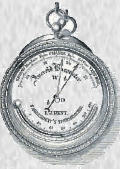


Data Rescue
ACRE’s Commitment
The Importance of Data Rescue
ACRE is committed to building accessible databanks of terrestrial & marine surface climate data covering the globe for the last 250 years. The data are crucial to our understanding of past weather phenomenon and it can also help us understand today’s weather and climate and aid the prediction of how climate might change in future. The Challenge The historical record of our climate is preserved in a variety of formats. Some, from the computer era, is recorded in electronic format and only needs the commitment of national meteorological services to make their data available for consolidation into a centralised global databank. Other data exists as the paper records of professional meteorologists who meticulously recorded instrumental data. The historical record is also held in the wider community in formats such as the diaries of explorers, missionaries and “gentleman” scientists, in government and newspaper reports, in private archives and in the observations of telegraphists, postmasters, lighthouse keepers and private citizens. Surface marine climate data are typically found in the ship logbooks, captain’s remark books, and the records of port authorities. Consolidating the paper records into a global databank presents a major challenge for a number of reasons: 1 . Many have been lost or misplaced, requiring dedicated “data-detectives” to hunt them down. 2 . Some are held in archives that are under threat from under-funding, poor control or environmental degradation (eg. mould, fading ink). 3 . A large number are recorded in handwriting which varies from legible to incomprehensible. 4 . The volume of the historical record can be overwhelming, comprising millions of data points for a single geographical region over a period of 200 years. 5 . The type and quality of records can be highly variable, posing a challenge in bringing together the data they contain into a coherent and homogenous databank. 6 . There are large gaps in the climate record, especially over the oceans where sparse data are only available in scattered shipping journals, or in colonial-era countries that have a comprehensive record extending to periods before independence. ACRE’s Core Task The process of salvaging these paper-based climate histories is called “Data Rescue”. It involves the discovery, identification and cataloguing of worldwide records, imaging (scanning, photographing) them and then transcribing into electronic form (digitising) the useful climatic data they contain. This is a major pillar of ACRE’s core activities. Given the immensity of the task, ACRE acts as a coordinator of many independent funded and unfunded projects that undertake data rescue activities around the globe. A diverse community of climate researchers, meteorologists, social scientists, archivists and citizen scientists have committed themselves to ACRE’s vision of building a comprehensive climate record that is available to all. ACRE achieves its coordinating role by • Fostering a community of partners that are interested in historical climatology • Fostering the establishment of citizen science initiatives to undertake regional climate data rescue • Assisting with funding applications for data rescue activities • Informing national meteorological services of the importance of investing in data rescue • Encouraging young scientists to engage with climate history • Identifying and cataloguing new sources of the climate record • Validating known material and cross-referencing with natural proxies (tree rings, coral and ice cores, sediments, etc) • Ensuring existing climate data are consolidated into open-access global databanks • Developing methods of expressing climate narratives in numeric form • Undertaking its own data rescue activities • Organising global and regional conferences on data rescue • Coordinating between projects Sources of the historical climate record Below are representative samples of climate records that are being rescued and digitised by ACRE Partners: Terrestrial data: • Mauritius terrestrial observations (late 18th to early 20th centuries) held by the National Archives of Mauritius and the Mauritius Meteorological Service • Japan-Asia Climate Data covering the Japanese mainland, various Japanese colonial territories in China and Korea during WW2, plus counties and islands in the NW Pacific • Canadian Journals (1740’s – 1870’s) of a multitude of weather observers • Sir Charles Todd Weather Folios (1879-1909) – covering Australia and New Zealand with over one million data points • Daily Weather Records and Annual Yearbooks of National Meteorological Services extending back into the mid 19th Century, with often an overlap of stations across several neighbouring countries and listings from overseas colonies – eg. UK, France, Germany, Spain, Austria, Greece, Italy, India. • US Weather Bureau Bulletin of International Meteorological Observations (1875-1887), with once daily tabulations of primarily Northern Hemisphere (limited Southern Hemisphere data for southern Africa, South America, Australia and New Zealand regions) terrestrial and marine surface weather observations Marine data: • English East India Company (EIC) logbooks (1798 -1834) – held in the British Library where 900 of the 2,000 logs have instrumental data • Extended World War 1 period logbooks (1914-1923) - held at the National Archives in the UKcomprising 350,000 pages of logbooks • US Government ship logs of Arctic voyages in the mid-19th century containing 300,000+ pages • Chinese and South China Sea instrumental weather observations. • Chilean Ship Logbooks (1860 – on) and lighthouse weather records • UK Colonial registers and Royal Naval Logbooks – including logbooks of ships on voyages of discovery 1700-1850 held at The National Archives in the UK • Extraxts from Logbboks of ships that sailed the seas around Australia in the 1890s and 1900s containing some 700,000 lines held at the National Archives, Brisbane



“Consolidating the paper
record presents a major
challenge…”
“ACRE coordinates many
projects around the globe
that under-take data
rescue…”
“US ship logbooks of
Arctic voyages contain
300,000 paes of weather
data…”











